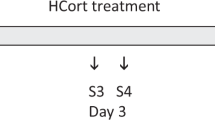Abstract
It is known that glucocorticoids can influence anterior pituitary hormones other than ACTH. Their effects on the hypothalamic-pituitary-thyroid axis are controversial. To further investigate this issue, the acute and chronic effects of high plasma cortisol levels on TSH secretion were evaluated in 20 normal subjects and in 14 patients with Cushing’s syndrome. In normals, high plasma cortisol levels were obtained by giving ACTH 250 μg or CRH 100 μg iv as a bolus or by an hydrocortisone 500 mg infusion over 1 h. Acute cortisol increase produced no effect both on basal and TRH-stimulated TSH secretion. In patients with Cushing’s syndrome, basal TSH levels, low or suppressed, showed an impaired response to TRH, inversely correlated with urinary cortisol values. After successful surgery, TSH and its response to TRH became normal in concomitance with the normalization of plasma and urinary cortisol levels. Our data show the lack of an acute inhibitory effect of high plasma cortisol levels on TRH-TSH axis. However, after long-term exposure to high plasma cortisol levels, i.e. Cushing’s syndrome, inhibition of both basal and TRH-stimulated TSH secretion was demonstrated. These findings indicate that only prolonged hypercortisolism does interfere with pituitary TSH secretion. The underlying mechanisms are still unclear.
Similar content being viewed by others
References
Euker J.S., Meiters J., Riegle G.D. Effects of acute stress on serum LH and prolactin in intact, castrate and dexamethasone-treated male rats. Endocrinology 96: 85, 1975.
Re R.N., Kourides I.A., Ridgway F.C., Weintraub B.D., Maloof F. The effect of glucocorticoid administration on human pituitary secretion of thyrotropin and prolactin. J. Clin. Endocrinol. Metab. 43:338, 1976.
Faglia G., Ferrari P., Beck-Peccoz P., Spada A., Travaglini P., Ambrosi B. Reduced plasma thyrotropin response to thyrotropin releasing hormone after dexamethasone administration in normal subjects. Horm. Metab. Res. 5:289, 1973.
Dussault J.H. The effect of dexamethasone on TSH and prolactin secretion after TRH stimulation. Can. Med. Assoc. J. 111: 3195, 1974.
Otsuki M., Dakoda M., Bab S. Influence of glucocorticoids on TRF-induced TSH response in man. J. Clin. Endocrinol. Metab. 36:95, 1973.
Sowers J.R., Carlson H.E., Brautbar N., Hershman J.M. Effect of dexamethasone on prolactin and TSH responses to TRH and metoclopramide in man. J. Clin. Endocrinol. Metab. 44:237, 1977.
Brabant A., Brabant G., Schurmeyer T.H., Ranft U., Schmidt F.W., Hesch R.W., von zur Mühlen A. The role of glucocorticoids in the regulation of thyrotropin. Acta Endocrinol. (Copenh.) 121:95, 1989.
Woolf P.D., Gonzalez-Barcena D., Schalch D.S., Lee L.A., Arzac J.P., Serially A.V., Kastin A.J. Lack of effect of steroids on thyrotropin-releasing hormone (TRH) mediated thyrotropin (TSH) release in man. Neuroendocrinology 13:56, 1973/74
Barbieri C., Baruto C., Sala M., Bigatti G., Parodi M., Bellini P., Bevilacqua M. Lack of effect of deflazacort, a novel glucocorticoid, on basal and TRH-stimulated prolactin and thyrotropin levels in healthy subjects. Eur. J. Clin. Pharmacol. 29:123, 1985.
Brabant A., Brabant G., Ranft U., Okran K., Köhrle R.D., von zur Mühlen A. Circadian and pulsatile thyrotropin secretion in euthyroid man under the influence of thyroid hormone and glucocorticoid administration. J. Clin. Endocrinol. Metab. 65:83, 1987.
Haigler E.D., Pittman J.A., Hershman J.M., Baugh C.M. Direct evaluation of pituitary thyrotropin reserve utilizing synthetic thyrotropin releasing hormone. J. Clin. Endocrinol. Metab. 33:573, 1971.
Wilber J.F., Utiger R.D. The effect of glucocorticoids on thyrotropin secretion. J. Clin. Invest. 48:1969, 1969.
Nicoloff J.T., Fisher D.A., Appleman M.D. The role of glucocorticoids in the regulation of thyroid function in man. J. Clin. Invest. 49:1922, 1970.
Duick D.S., Wahner H.W. Thyroid axis in patients with Cushing’s syndrome. Arch. Intern. Med. 139:767, 1979.
Hershman J.M., Pittman J.A. Response to synthetic thyrotropin-releasing hormone in man. J. Clin. Endocrinol. Metab. 31:457, 1970.
Saito S., Abe K., Yoshida H., Kanedo T., Nakamura E., Shimizu N., Yanaihara N. Effects of synthetic thyrotropin-releasing hormone on plasma thyrotropin, growth hormone and insulin levels in man. Endocrinol. Jpn. 18:101, 1971.
Krieger D.T., Howanitz P.J., Frantz A.G. Absence of nocturnal elevation of plasma prolactin concentrations in Cushing’s disease. J. Clin. Endocrinol. Metab. 42:262, 1976.
Visser T.J., Lamberts S.W. Regulation of TSH secretion and thyroid function in Cushing’s disease. Acta Endocrinol. (Copenh.) 96:480, 1981.
Benker G., Raida M., Olbricht T., Wagner R., Reinhardt W., Reinwein D. TSH secretion in Cushing’s syndrome: relation to glucocorticoid excess, diabetes, goitre, and the “sick euthyroid syndrome”. Clin. Endocrinol. (Oxf.) 33:777, 1990.
Suzuki M.R., Kikuyama S. Corticoids augument nuclear, binding capacity for triiodothyronine in bullfrog tadlope tail fins. Gen. Comp. Endocrinol. 52:272, 1983.
De Nayer P.H., Dozin B., Vandeput Y., Bottazzo F.C., Crabbe J. Altered interaction between triiodothyronine and its nuclear receptor in absence of cortisol: a proposed mechanism for increased thyrotropin secretion in corticosteroid deficiency states. Eur. J.Clin. Invest. 17:106, 1987.
Recupero A.R., Coleoni A.H., Cherubini O., Ovideo A. Selective alterations in hepatic nuclear T3-receptors and enzyme responses by glucocorticoid deficit or excess. Acta Endocrinol. (Copenh.) 104:485, 1983.
Ahlquist J.A.O., Franklyn J.A., Ramsden D.B., Sheppard M.C. The influence of dexamethasone on serum thy-rotrophin and thyrotrophin synthesis in the rat. Mol. Cell. Endocrinol. 64:55, 1989.
Boscaro M., Scaroni C., Masarotto P., Mantero F. Circadian secretion of ACTH, Cortisol, and mineral-corticoids in Cushing’s syndrome. Clin. Exp. Hyper. Theory Pract. A4:1779, 1982.
Bartalena L., Martino E., Petrini L., Veluzzi F., Loviselli A., Grasso L., Mammoli C., Pinchera A. The nocturnal serum thyrotropin surge is abolished in patients with adrenocorticotropin (ACTH)-dependent or ACTH-independent Cushing’s syndrome. J. Clin. Endocrinol. Metab. 72:1195, 1991.
Weinberger C., Thompson C.C., Ong E.S., Lebo R., Gruol D.J., Evans M.R. The c-erb-A gene encodes a thyroid hormone receptor. Nature 324:641, 1986.
Author information
Authors and Affiliations
Rights and permissions
About this article
Cite this article
Rubello, D., Sonino, N., Casara, D. et al. Acute and chronic effects of high glucocorticoid levels on hypothalamic-pituitary-thyroid axis in man. J Endocrinol Invest 15, 437–441 (1992). https://doi.org/10.1007/BF03348767
Received:
Accepted:
Published:
Issue Date:
DOI: https://doi.org/10.1007/BF03348767




